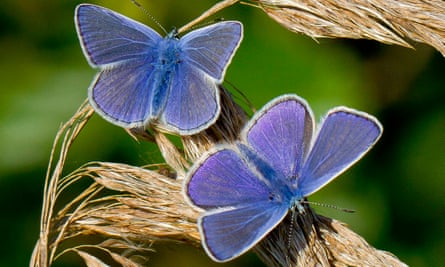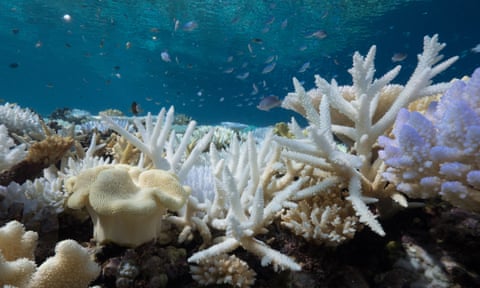Good morning, this is Helen Sullivan bringing you the main stories and must-reads on Tuesday 2 April.
Top stories
After spending more than two years trying to shed light on Australia’s enormous lobbying effort to prevent the Great Barrier Reef from being listed as “in danger” by Unesco, a legal expert has slammed Australia’s freedom-of-information regime.. A group of Australian and US environmental lawyers had found the dangers to the reef overwhelmingly met the criteria for such a listing, but Australia’s lobbying was ultimately successful. The legal academic, Prof Reece Walters of Deakin University, wanted to understand how far Australia had gone in its taxpayer-funded campaign. He lodged a freedom-of-information request in August 2016 for relevant correspondence but was given heavily redacted documents. Eventually, the information commissioner ordered the authority to disclose more but the information was not what he wanted and years of delays rendered it almost useless.
MPs are voting Monday evening UK time on four alternatives to Theresa May’s thrice-rejected Brexit deal, including a customs union and a Norway-style deal, as backbenchers seek to force the government to change course. With 11 days to go until Britain is due to leave the European Union, with or without a deal, the speaker, John Bercow, selected four of the options tabled by MPs for consideration in “indicative votes”. They are a customs union; a “common market 2.0”; a “confirmatory” referendum; and a motion aimed at allowing parliament to prevent a no-deal Brexit. And earlier on Monday, the Brexit debate was disrupted by semi-naked protesters.
The Morrison government will use Tuesday’s budget to allow 65 and 66-year-olds to make voluntary superannuation contributions without meeting the current work test. The proposal, to take effect from 2020-21, is part of the government’s efforts to court older voters ahead of the looming federal election, and potentially benefits 55,000 people. (Follow the Guardian politics liveblog from 8am, with full budget coverage from 7.30pm).
Meanwhile, Liberal party senator Arthur Sinodinos has broken ranks on the eve of the budget to call for an increase to the Newstart allowance, becoming the first government MP to do so. “Over time it should be higher,” the New South Wales senator told the ABC’s Q&A program. “There is a cost to the budget, there’s an expense. But budgets are all about choices.” Noting he was expressing a “personal view” not government policy, Sinodinos said his position was shared by former prime minister John Howard, who called for a boost to the payment in May last year. He also appeared to question the government’s decision to exclude those on the payment from a budget cash splash that will hand nearly four million welfare recipients a one-off payment to cover energy bills.
World

Turkish president Recep Tayyip Erdoğan’s grip on Turkey has been challenged by a resurgent opposition in local elections, with his ruling Justice and Development party losing control of Ankara and on track to lose Istanbul, according to unofficial local election results.
As former US vice-president Joe Biden faced intense scrutiny of his behaviour towards women, the wife of former defence secretary Ash Carter has dismissed claims that a picture of her with Biden was an example of unwanted touching.
Venezuela’s authoritarian leader, Nicolás Maduro, has called on armed pro-government groups to help subdue unrest as he announced a 30-day electricity rationing plan set to inflict further pain on the population.
A group of Google employees have called for the removal of a rightwing thinktank leader from the company’s new artificial intelligence council, citing her anti-LGBT and anti-immigrant record.
An off-duty Swedish police officer successfully arrested a violent fugitive drug dealer while both men were naked in a Stockholm sauna. “This was about as stripped-back and bare-bones an arrest as it is possible to make, in several senses of the term,” said Christoffer Bohman, the deputy chief of police in the Stockholm suburb of Rinkeby.
Opinion and analysis

Insects have “no place to hide” from climate change, scientists have said after analysing 50 years’ worth of UK data. The study found that woodlands, whose shade was expected to protect species from warming temperatures, are just as affected by climate change as open grasslands. The research examined records of the first springtime flights of butterflies, moths and aphids, and the first eggs of birds between 1965 and 2012. As average temperatures have risen, aphids are now emerging a month earlier, and birds are laying eggs a week earlier. The scientists said this could mean animals were becoming “out of sync” with their prey, with potentially serious ramifications for ecosystems.
Australia’s global leadership on whale conservation will be tested as Japanese hunters move to a different hemisphere, writes Darren Kindleysides. If we go to the polls in May, within a month or so of the next Australian government taking office, Japan will head back out to kill whales in its own waters. What impact this will have on these migratory species isn’t clear but the cruelty of killing and stripping the seas of our ocean giants is beyond dispute.
Sport
Australia is copying New Zealand’s policy of resting Test players in Super Rugby to ensure they are fresh and fit for the World Cup in Japan. But results at the weekend demonstrated there is a right way and a wrong way for Australian teams to rotate players.
After a heavy 4-1 defeat in Wellington last weekend, Newcastle Jets’ outside chances at a finals run are effectively over, locking in this season’s A-League championship contenders. But with a post-season system that rewards over half the teams in the league, which of the six have really earned their place?
Thinking time: What’s next for the Murray-Darling?

Since Guardian Australia investigated the Murray-Darling a year ago, the health of Australia’s greatest river system and the $13bn plan to save it have been thrust into the centre of the national political debate, writes Anne Davies.
The most dramatic warning has been the deaths of hundreds of thousands of fish at Menindee. The deaths of 40 and 50-year-old Murray cod, which survived the millennium drought of the early 2000s but perished this time around, horrified Australians and raised serious questions about the management of the river.
There are now marked policy differences between the Coalition and Labor at state and federal level over what should happen next under the plan, though both major parties remain committed to retaining the plan itself. The question is: can the basin plan be reformed – and the remaining $4.5bn be spent constructively – without the key stakeholder states and the farming lobby pulling out of the plan?
Media roundup
The Australian Financial Review’s front page bears the headline ALP plan reignites carbon wars, and the Daily Telegraph describes the Labor climate plan as Pay as you eat. Josh Frydenberg is on the front pages of the Sydney Morning Herald – Frydenberg under pressure to deliver – the West Australian, the Canberra Times and the Australian, with the Oz’s headline as Coalition defuses debt bomb, in a story revealing that the treasurer “will today declare an end to the debt and deficit disaster the Coalition inherited from Labor six years ago”. The NT News, meanwhile, recounts the death-defying swim made by a feral cat across croc-infested waters, under the headline The little purr-maid.
Coming up
The federal budget will be handed down in Canberra. Follow the Guardian politics liveblog from 8am, with full budget coverage from 7.30pm.
The trial of Sydney doctor Sharif Fattah, who is accused of sexual assault, continues.
Feeling experimental?

We are testing the Guardian Briefing, an audio news briefing adapted for Google Home devices and the Google Assistant. Using a mix of both human and synthetic voices, the Guardian Briefing brings you the top headlines in under two minutes, and stays up-to-date throughout the day.
Give it a try by saying “Hey Google, ask for the Guardian Briefing”. It is compatible with Google Assistant-enabled devices including Google Home speakers and Android/iOS smartphones. iPhone users will need to install the free Google Assistant app. You can find out more about the experiment on the Guardian Voice Lab blog. We’d love to hear what you think – help us to get it right by emailing your thoughts tovoicelab@theguardian.com.
Sign up
If you would like to receive the Guardian Australia morning mail to your email inbox every weekday, sign up here.
